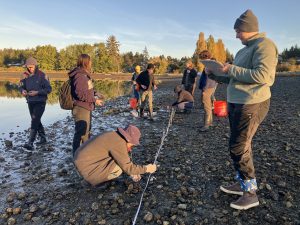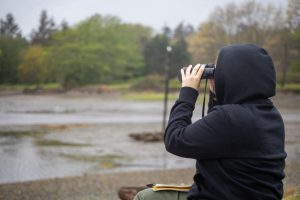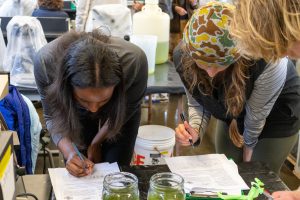FHL 375, FHL 403, FHL 450, FHL 480, FHL 490 | Spring 2025
Spring Marine Studies Program 2025
Marine Mammals of the Salish Sea (FHL 375, 5 credits)
Instructor: Dr. Deborah Giles, Whale Researcher at the University of Washington Center for Conservation Biology & Science and Research Director at Wild Orca.
 The Salish Sea provides the ideal backdrop to study marine mammals. This course will provide students new to the biological sciences an opportunity to learn about the wide variety of marine mammals found here and the ecosystems that support them. This course focuses on the biology and conservation of marine mammals and their habitats and the key processes that created them. Discussions will include various topics of marine mammal science and conservation including: taxonomy, morphology including adaptations for marine realm, behavior (feeding strategies, social interactions, reproduction, etc.), habitat use and range, acoustics, anthropogenic impacts, and management of threatened or endangered animals. Students will be taught how to collect marine mammal data such as behavior and population estimates, and may also participate in necropsies. There will be several field trips, both land based and boat based, focused on observing marine mammals in their natural habitats. Students should be prepared to conduct field observations in inclement weather.
The Salish Sea provides the ideal backdrop to study marine mammals. This course will provide students new to the biological sciences an opportunity to learn about the wide variety of marine mammals found here and the ecosystems that support them. This course focuses on the biology and conservation of marine mammals and their habitats and the key processes that created them. Discussions will include various topics of marine mammal science and conservation including: taxonomy, morphology including adaptations for marine realm, behavior (feeding strategies, social interactions, reproduction, etc.), habitat use and range, acoustics, anthropogenic impacts, and management of threatened or endangered animals. Students will be taught how to collect marine mammal data such as behavior and population estimates, and may also participate in necropsies. There will be several field trips, both land based and boat based, focused on observing marine mammals in their natural habitats. Students should be prepared to conduct field observations in inclement weather.
Suggested Prerequisites: BIOL 180, FISH 250, ENVIR 100, OCEAN 101, or OCEAN 200
Questions about prerequisites/eligibility to take this course? Contact the Academic Services Manager at fhlstudents@uw.edu.
UW marine biology majors enrolled in this course will Biodiversity elective credit.
Novel Marine Ecosystems (FHL 403, 5 credits)
Instructor: Dr. Marjorie Wonham, associate teaching professor at the University of Washington

In Novel Marine Ecosystems students will conduct field- and lab-based research to study the real-time dynamics of novel and hybrid marine ecosystems as they emerge through biotic changes (species deletions and additions) and abiotic changes. In discussions and other activities we will explore the concepts of how and why these ecosystems are forming, how ecological theory and research can help us understand them, and what conservation and management challenges and solutions they offer. In this Integrative Field Experience (IFE) course, students will be expected to apply their knowledge and skills from other courses to the focal questions in this one. Readings will be peer-reviewed journal articles and book chapters.

Prerequisites: either FISH 310, FISH 312, FISH 323, FISH 370/MARBIO 370/OCEAN 370, BIOL 356, OCEAN 320, or OCEAN 330
Recommended prerequisites: background in marine ecology; evolution; and ecosystems and organisms; and a course in quantitative reasoning at the level of either Q SCI 381 or STAT 311
Questions about prerequisites/eligibility to take this course? Contact the Academic Services Manager at fhlstudents@uw.edu.
No textbook is required for this course.
UW students enrolled in this course will earn (W) credit.
UW students enrolled in FHL 403 are eligible to apply to the Mary Gates Endowment for FHL.
UW marine biology majors enrolled in this course will earn integrative field experience (IFE) credit.
Professional Portfolio in Marine Science (FHL 480, 5 credits)
Instructor: Dr. Marjorie Wonham, associate teaching professor at the University of Washington

How will you incorporate marine biology into your future? You’ve invested in your education and acquired a unique combination of knowledge and skills and interests. How do you now synthesize, integrate, and articulate what you have learned – and more importantly how and why you learn – for yourself and for future graduate programs and employers? In this course you will build an e-portfolio that reflects your academic development and builds your professional future. You will gain a deeper understanding of the core values and ideals that motivate you, acquire a suite of tools for aligning your personal and professional principles, showcase your moments of most transformative learning, and write research, grant, or fellowship pitches and proposals. You will be able to select items from this e-portfolio to highlight in future conversations about who you are, what you do, and why you do it. If knowledge is power, knowledge about knowledge is the super-power you will develop in this course.
Marine Restoration Ecology (FHL 450, 6 credits, formerly FHL 495)
Instructors: Dr. Jason Hodin, Senior Research Scientist at FHL and Mitch McCloskey, Eelgrass Restoration Project Manager at San Juan Islands Conservation District
The Salish Sea, like all biomes, is under increasing threat from the impact of human activities, which jeopardize its vital ecosystems. Can we take action rather than passively witnessing the consequences of these disturbances? Should we? If so, how can we define effective action? Our course delves into the challenges and opportunities within marine ecosystem restoration—a field that presents unique challenges as it lies at the leading edge of scientific knowledge.
This course leverages ongoing restoration efforts at FHL to provide students with firsthand experience of the complexities involved in marine restoration. It operates at the juncture of science and management, employing scientific research to develop effective restoration techniques, and uses restoration insights to provoke new and testable scientific hypotheses. This blend of perspectives is often most successful when managed by individuals who are conversant in both realms—science and management practice. Our goal is to dismantle the perceived barriers between these groups in order to enhance efforts to conserve the Salish Sea.
The course is structured into three main components: lectures and discussions, practicum, and a collaborative research project. Lectures and discussions will cover foundational concepts of restoration ecology and introduce a variety of marine restoration initiatives, both local and global. For the practicum, students will select from projects focused on sea stars, eelgrass, or kelp at FHL, gaining practical experience in the field. Students will also collaborate across practicum groups to address questions that loom beyond a single species, fostering a more holistic understanding of and approach to ecosystem restoration.

Through this integrated approach, students will gain a fuller understanding of the scientific and practical aspects of marine restoration, preparing them to contribute effectively to the field.
UW students enrolled in this course will earn (R) credit.
UW students enrolled in FHL 495 are eligible to apply to the Mary Gates Endowment for FHL.
UW marine biology majors enrolled in this course will earn integrative field experience (IFE) credit.
Marine Sciences Seminar (FHL 490, 1 credit)
Instructor: Dr. Karly Cohen
There will be one lecture per week by research scientists. The topics will cover different fields of research. Participation is obligatory for registered students wanting to gain credits, but all students are encouraged to attend. No textbook required.